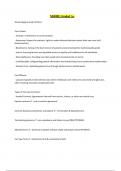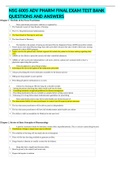Exam (elaborations)
NBDHE Graded A+
- Course
- Institution
NBDHE Graded A+ Dental Hygiene Code of Ethics Core Values: - Veracity: Truthfulness in communication. - Autonomy: Respect for patients' rights to make informed decisions about their own care (self determination). - Beneficence: Acting in the best interest of patients and promoting their well-b...
[Show more]




